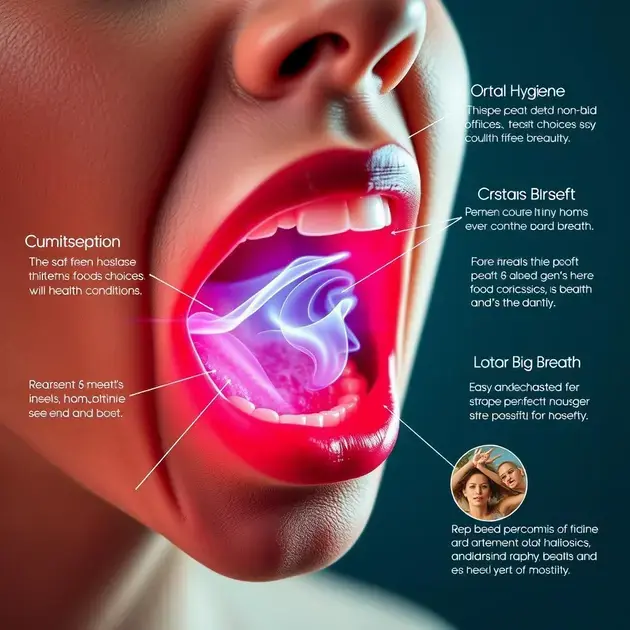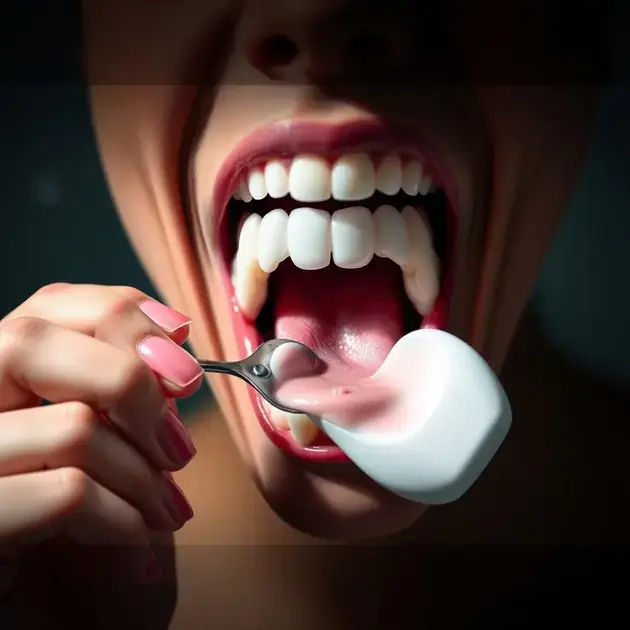Understanding the causes of bad breath is essential for maintaining not only oral health but also for boosting self-confidence. Often, bad breath, or halitosis, stems from various sources, ranging from the food we consume to deeper health issues. By delving into these causes, individuals can take proactive steps to prevent unpleasant odors and ensure their breath remains fresh throughout the day.
One primary source of bad breath is the buildup of bacteria in the mouth, particularly on the tongue and between the teeth. These bacteria can produce foul-smelling compounds when they break down food particles left in the mouth after eating. Moreover, poor oral hygiene, such as not brushing or flossing regularly, can exacerbate the problem by allowing plaque and bacteria to accumulate, further worsening breath issues.

Food and Drink Choices that Contribute to Bad Breath
When it comes to bad breath, the food and drinks we consume play a significant role in either exacerbating or minimizing the issue. Certain choices can contribute to halitosis, making it essential to be mindful of what we consume. Here are some food and drink choices that can lead to bad breath:
1. Garlic and Onions
Garlic and onions contain sulfur compounds that can linger in the mouth and lungs, leading to unpleasant breath odor. To minimize the impact of these foods on bad breath, consider consuming them in moderation and following up with thorough oral hygiene practices.
2. Coffee and Alcohol
Coffee and alcohol can both contribute to dry mouth, a common cause of bad breath. To combat this effect, make sure to stay hydrated by drinking plenty of water throughout the day. Additionally, consider reducing your intake of coffee and alcohol to help improve your breath.
3. Sugary Foods and Drinks
Sugary foods and drinks can feed the bacteria in your mouth, leading to the production of foul-smelling compounds. To reduce the impact of sugary items on bad breath, opt for sugar-free alternatives and practice good oral hygiene habits such as brushing and flossing regularly.
4. Spicy Foods
Spicy foods can cause acid reflux and lead to stomach upset, both of which can contribute to bad breath. If you enjoy spicy foods, consider incorporating probiotics into your diet to help maintain a healthy balance of gut bacteria and reduce the likelihood of bad breath.
5. Dairy Products
Dairy products, especially those high in lactose, can create an environment in the mouth that is conducive to bacterial growth and bad breath. To mitigate this effect, consider opting for lactose-free or dairy alternatives and maintaining a consistent oral care routine.
The Impact of Oral Hygiene Practices on Halitosis
Proper oral hygiene practices are essential for maintaining fresh breath and preventing halitosis. By following a thorough oral care routine, you can significantly reduce the likelihood of experiencing bad breath. Here are some key oral hygiene practices and their impact on halitosis:
1. Brushing and Flossing
Regular brushing and flossing are crucial for removing food particles and plaque that can contribute to bad breath. Make sure to brush your teeth at least twice a day and floss once a day to keep your mouth clean and fresh.
2. Using Mouthwash
Antibacterial mouthwash can help reduce bacteria in the mouth that cause bad breath. Incorporate mouthwash into your daily oral hygiene routine to freshen your breath and maintain oral health.
3. Tongue Scraping
The surface of the tongue can harbor bacteria and debris that contribute to bad breath. Use a tongue scraper to gently clean your tongue and remove buildup, helping to improve breath odor.
4. Regular Dental Check-ups
Visiting your dentist regularly for check-ups and cleanings is crucial for preventing and addressing issues that can lead to bad breath. Your dentist can identify any underlying oral health problems and provide guidance on maintaining fresh breath.
5. Healthy Lifestyle Habits
Practicing good overall health habits, such as staying hydrated, eating a balanced diet, and avoiding tobacco products, can contribute to fresh breath. Maintaining a healthy lifestyle can support your oral hygiene efforts and help prevent halitosis.
Exploring Underlying Health Conditions Related to Bad Breath
While oral hygiene and food choices play a significant role in bad breath, certain underlying health conditions can also contribute to halitosis. By exploring these health conditions, you can gain a better understanding of potential factors impacting your breath odor. Here are some health conditions to consider:
1. Gum Disease
Gum disease, also known as periodontal disease, can cause persistent bad breath due to bacterial buildup in the gums. Maintaining good oral hygiene and seeking treatment for gum disease can help alleviate bad breath associated with this condition.
2. Dry Mouth
Dry mouth, or xerostomia, can result from various factors such as medication side effects or certain health conditions. Inadequate saliva production can lead to bad breath, as saliva helps clean the mouth and neutralize acids. Stay hydrated and consider using saliva substitutes to combat dry mouth and improve breath odor.
3. Respiratory Infections
Respiratory infections, such as sinus infections or bronchitis, can contribute to bad breath through the release of bacteria and mucus in the respiratory tract. Treating the underlying infection with appropriate medical care can help reduce bad breath associated with respiratory conditions.
4. Digestive Disorders
Digestive disorders like acid reflux or gastritis can lead to stomach acids entering the esophagus and mouth, causing bad breath. Managing these conditions through dietary adjustments, medication, and lifestyle changes can help alleviate bad breath symptoms.
5. Systemic Conditions
Certain systemic conditions, such as diabetes or liver disease, can manifest in symptoms that include bad breath. Monitoring and managing these conditions with the help of healthcare professionals can aid in improving overall health outcomes, potentially reducing bad breath as a result.

**Poor Habits that Exacerbate Bad Breath**
Poor Oral Hygiene Habits
One of the main contributors to bad breath is poor oral hygiene habits. Failing to brush and floss regularly allows bacteria to build up in the mouth, leading to the production of foul-smelling gases. When plaque is not removed from the teeth, it can cause gum disease, which is another common cause of bad breath. To prevent bad breath associated with poor oral hygiene, it is essential to brush your teeth at least twice a day and floss daily. Additionally, using an antimicrobial mouthwash can help kill bacteria and freshen breath.
Irregular Dental Check-ups
Another significant factor that exacerbates bad breath is neglecting regular dental check-ups. These appointments are crucial for detecting any oral health issues early on, such as gum disease or tooth decay, which can contribute to bad breath. By skipping these routine visits, you may be allowing underlying problems to worsen and lead to persistent bad breath. It is recommended to visit your dentist at least twice a year for professional cleanings and examinations to maintain good oral health and prevent bad breath.
Smoking and Tobacco Use
Smoking and tobacco use are not only harmful to overall health but also major culprits for causing bad breath. The chemicals in tobacco products can linger in the mouth and lungs, leaving a distinct odor that is difficult to mask. In addition, smoking contributes to dry mouth, which can further exacerbate bad breath by reducing saliva production. To combat the effects of smoking on bad breath, quitting tobacco products is crucial. Seeking support from healthcare professionals or smoking cessation programs can help individuals break the habit and improve their oral health.
Poor Dietary Choices
The foods we consume can also play a significant role in exacerbating bad breath. Certain foods, such as garlic, onions, and spicy dishes, contain strong odors that can linger in the mouth and be released during exhalation. Additionally, sugary and acidic foods can fuel the growth of bacteria in the mouth, contributing to foul-smelling breath. To combat the effects of poor dietary choices on bad breath, it is advisable to limit the consumption of odorous foods and maintain a balanced diet rich in fruits, vegetables, and whole grains. Drinking plenty of water can also help flush out food particles and bacteria that cause bad breath.
Conclusion
In conclusion, poor oral hygiene habits, irregular dental check-ups, smoking and tobacco use, and poor dietary choices are all significant factors that can exacerbate bad breath. Neglecting proper oral care practices like regular brushing, flossing, and dental check-ups allows bacteria to thrive in the mouth, leading to foul-smelling breath. Additionally, smoking and tobacco use not only harm overall health but also contribute to dry mouth and lingering odors that worsen bad breath.
Furthermore
Furthermore, making poor dietary choices, such as consuming odorous foods high in sugar and acids, can fuel the growth of bacteria in the mouth, contributing to bad breath. To combat these issues, individuals should prioritize good oral hygiene practices, including regular dental visits, quitting tobacco products, and maintaining a balanced diet rich in fruits, vegetables, and whole grains. Drinking an adequate amount of water also helps flush out food particles and bacteria, promoting fresher breath and overall oral health.
Ultimately
Ultimately, addressing these poor habits and making positive changes in oral care routines and lifestyle choices are crucial for preventing and reducing bad breath. By adopting healthy habits and seeking professional dental care when needed, individuals can improve their oral health, boost their confidence, and enjoy fresher breath. Remember, maintaining good oral hygiene goes beyond just a bright smile; it is essential for overall health and well-being.
